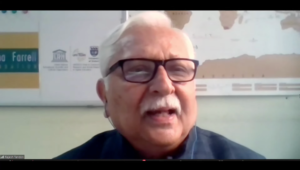Date/Time
Date(s) - 10/12/2021
10:30 am
Categories No Categories

Dr Tandon began by discussing that the Pandemic has had a significant impact on our work and communities. It has particularly impacted higher education institutions and the learning that takes place in the same. The first thing to recognise is that teaching and learning suddenly got disrupted, and what was a natural and assumed practice of a collaboration between teachers and students got disrupted. While we have been able to find digital solutions to facilitate the same, very few HEIs have the capacities to enable learning online, and very few learners have access to digital technology. Parallely, COP 26 reminds us that despite being home, we all witnessed climate change impacts in the Indian subcontinent with greater intensity. How do we then prepare HEIs going forward, keeping in mind the health pandemics and other pandemics are here to stay and how to minimise their impact, become resilience and find new ways of functioning? HEIs have a social responsibility for providing the solution to the same.
First pathway is finding contextual solutions for hybridisation of learning process, accepting online reality but not treating it as a panacea. Second pathway is demand for multi-disciplinarity. Subject leaders need to relook at their disciplines not in an isolated manner, rather in a multi-disciplinary manner to achieve SDGs. Third pathway is preparing next-gen professionals for addressing SDGs within their own disciplines, but also through an inter-disciplinary lens.
No one knowledge solution fits all; therefore partnership-driven solutions which can find contextual answers to local challenges are important. Now is the time to frame higher education in a lifelong learning frame to catalyse sustained learning throughout life and for all aspects of life; therefore we need to reorient extension courses not just for those who dropped out but even those who need reskilling, relearning of skills. This is the social responsibility of HE to frame their teaching and research in a lifelong learning framework. Today we have the NEP 2020, which speaks of creating a socially responsible higher education, and we can gather great support from this policy to translate into resource support. The second development is UNESCO has recently released the Futures of Education report, the ‘futures’ are seen through a horizontal lens; and it links higher education within this framework of lifelong learning. Finally UNESCO member states agreed to adopt the Recommendation on Open Science, that is not just about open data, but open to society and to multiple epistemologies. India is creating new policy on Science, Technology and Innovation and we have this opportunity to pursue changes in HE where teaching, research and engagement is oriented towards socially responsible higher education. Let us make higher education with and for society in a socially responsible manner.




